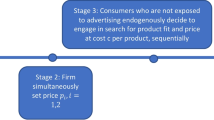Abstract
Internet advertising exchanges possess three characteristics—fast delivery, low values, and automated systems—that influence market design. Automated learning systems induce the winner’s curse when several pricing types compete. Bidders frequently compete with different data, which induces randomization in equilibrium. Machine learning causes the value of information to leak across participants. Discrimination may be used to induce efficient exploration, although publishers (websites) may balk at participating. The creation of “learning accounts,” which divorce payments from receipts, may be used to internalize learning externalities. Under some learning mechanisms the learning account eventually shows a surplus. The solution is illustrated computationally.
Similar content being viewed by others
References
Abdulkadiroglu, A., Parthak, P., Roth, A., & Sonmez, T. (2005). The Boston Public School match. In AEA papers and proceedings (pp. 368–371).
Abraham, I., Athey, A., Babaioff, M., & Grubb, M. (2011). Peaches, lemons, and cookies: Designing auction markets with dispersed information. Harvard University (unpublished).
Bax, E., Kuratti, A., McAfee, P., & Romero, J. (2011). Comparing predicted prices in auctions for online advertising (unpublished).
Edelman B., Ostrovsky M., Schwarz M. (2007) Internet advertising and the generalized second-price auction: Selling billions of dollars worth of keywords. American Economic Review 97: 242–259
Hendricks K., Porter R. (1988) An empirical study of an auction with asymmetric information. American Economic Review 78: 865–883
Kenney R., Klein B. (1983) The economics of block booking. Journal of Law & Economics 26: 497–540
Li, S., Mahdian, M., & McAfee, P. (2010). Value of learning in sponsored search auctions. In Proceedings of the 6th international workshop on internet and network economics (pp. 294–305).
Luenberger D. (1979) Introduction to dynamic systems: Theory, models and applications. Wiley, New York
Manne H. G. (1966) Insider trading and the stock market. Free Press, New York
McAfee P., McMillan J., Wilkie S. (2010a) The greatest auction in history. In: Siegfried J. J. (Ed.) Better Living Through Economics. Harvard University Press, Cambridge, MA, pp 168–184
McAfee, P., Papineni, K., & Vassilvitskii, S. (2010b). Maximally representative allocations for guaranteed delivery advertising campaigns (unpublished).
McMillan J. (1994) Selling spectrum rights. Journal of Economic Perspectives 8: 145–162
Milgrom P. (2000) Putting auction theory to work: The simultaneous ascending auction. Journal of Political Economy 108: 245–272
Roth A. (2010) Deferred-acceptance algorithms: History, theory, practice. In: Siegfried J. J. (Ed.) Better Living Through Economics. Harvard University Press, Cambridge, MA, pp 206–222
Roth A., Sonmez T., Unver U. (2005) Kidney exchange. AEA Papers and Proceedings 95: 376–380
Tietenberg T. (2010) The evolution of emissions trading. In: Siegfried J. J. (Ed.) Better Living Through Economics. Harvard University Press, Cambridge, MA, pp 42–58
Varian H. (2007) Position auctions. International Journal of Industrial Organization 25: 1163–1178
Wilson R. (1969) Competitive bidding with disparate options. Management Science 15: 446–448
Wilson R. (2002) Architecture of power markets. Econometrica 70: 1299–1340
Author information
Authors and Affiliations
Corresponding author
Rights and permissions
About this article
Cite this article
McAfee, R.P. The Design of Advertising Exchanges. Rev Ind Organ 39, 169–185 (2011). https://doi.org/10.1007/s11151-011-9300-1
Published:
Issue Date:
DOI: https://doi.org/10.1007/s11151-011-9300-1




